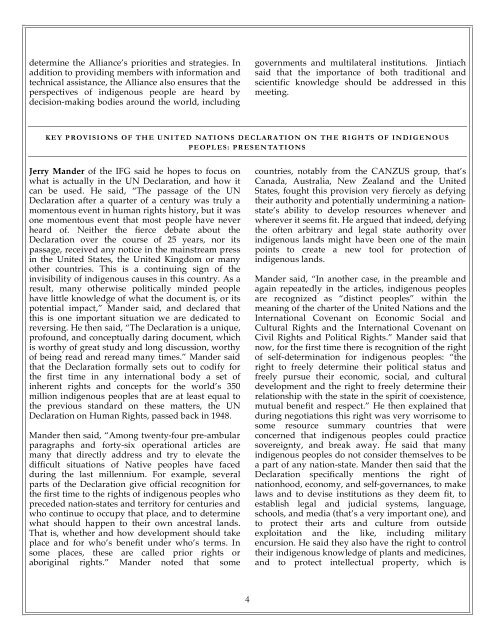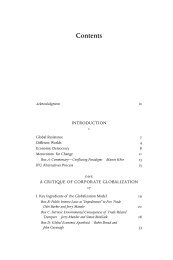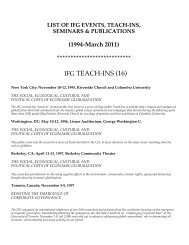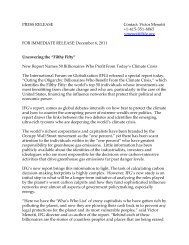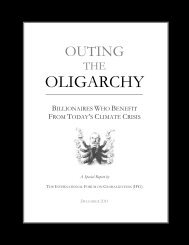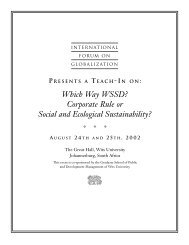UNDRIP Report - English FINAL - International Forum on Globalization
UNDRIP Report - English FINAL - International Forum on Globalization
UNDRIP Report - English FINAL - International Forum on Globalization
Create successful ePaper yourself
Turn your PDF publications into a flip-book with our unique Google optimized e-Paper software.
determine the Alliance’s priorities and strategies. In<br />
additi<strong>on</strong> to providing members with informati<strong>on</strong> and<br />
technical assistance, the Alliance also ensures that the<br />
perspectives of indigenous people are heard by<br />
decisi<strong>on</strong>-making bodies around the world, including<br />
governments and multilateral instituti<strong>on</strong>s. Jintiach<br />
said that the importance of both traditi<strong>on</strong>al and<br />
scientific knowledge should be addressed in this<br />
meeting.<br />
KE Y P ROVISI O NS OF THE U NI TED NA TI O NS DE CL AR A TION ON TH E RI GH TS OF INDIG E N O US<br />
PE OPL ES: PR ES E N TA TI ONS<br />
Jerry Mander of the IFG said he hopes to focus <strong>on</strong><br />
what is actually in the UN Declarati<strong>on</strong>, and how it<br />
can be used. He said, “The passage of the UN<br />
Declarati<strong>on</strong> after a quarter of a century was truly a<br />
momentous event in human rights history, but it was<br />
<strong>on</strong>e momentous event that most people have never<br />
heard of. Neither the fierce debate about the<br />
Declarati<strong>on</strong> over the course of 25 years, nor its<br />
passage, received any notice in the mainstream press<br />
in the United States, the United Kingdom or many<br />
other countries. This is a c<strong>on</strong>tinuing sign of the<br />
invisibility of indigenous causes in this country. As a<br />
result, many otherwise politically minded people<br />
have little knowledge of what the document is, or its<br />
potential impact,” Mander said, and declared that<br />
this is <strong>on</strong>e important situati<strong>on</strong> we are dedicated to<br />
reversing. He then said, “The Declarati<strong>on</strong> is a unique,<br />
profound, and c<strong>on</strong>ceptually daring document, which<br />
is worthy of great study and l<strong>on</strong>g discussi<strong>on</strong>, worthy<br />
of being read and reread many times.” Mander said<br />
that the Declarati<strong>on</strong> formally sets out to codify for<br />
the first time in any internati<strong>on</strong>al body a set of<br />
inherent rights and c<strong>on</strong>cepts for the world’s 350<br />
milli<strong>on</strong> indigenous peoples that are at least equal to<br />
the previous standard <strong>on</strong> these matters, the UN<br />
Declarati<strong>on</strong> <strong>on</strong> Human Rights, passed back in 1948.<br />
Mander then said, “Am<strong>on</strong>g twenty-four pre-ambular<br />
paragraphs and forty-six operati<strong>on</strong>al articles are<br />
many that directly address and try to elevate the<br />
difficult situati<strong>on</strong>s of Native peoples have faced<br />
during the last millennium. For example, several<br />
parts of the Declarati<strong>on</strong> give official recogniti<strong>on</strong> for<br />
the first time to the rights of indigenous peoples who<br />
preceded nati<strong>on</strong>-states and territory for centuries and<br />
who c<strong>on</strong>tinue to occupy that place, and to determine<br />
what should happen to their own ancestral lands.<br />
That is, whether and how development should take<br />
place and for who’s benefit under who’s terms. In<br />
some places, these are called prior rights or<br />
aboriginal rights.” Mander noted that some<br />
countries, notably from the CANZUS group, that’s<br />
Canada, Australia, New Zealand and the United<br />
States, fought this provisi<strong>on</strong> very fiercely as defying<br />
their authority and potentially undermining a nati<strong>on</strong>state’s<br />
ability to develop resources whenever and<br />
wherever it seems fit. He argued that indeed, defying<br />
the often arbitrary and legal state authority over<br />
indigenous lands might have been <strong>on</strong>e of the main<br />
points to create a new tool for protecti<strong>on</strong> of<br />
indigenous lands.<br />
Mander said, “In another case, in the preamble and<br />
again repeatedly in the articles, indigenous peoples<br />
are recognized as “distinct peoples” within the<br />
meaning of the charter of the United Nati<strong>on</strong>s and the<br />
<str<strong>on</strong>g>Internati<strong>on</strong>al</str<strong>on</strong>g> Covenant <strong>on</strong> Ec<strong>on</strong>omic Social and<br />
Cultural Rights and the <str<strong>on</strong>g>Internati<strong>on</strong>al</str<strong>on</strong>g> Covenant <strong>on</strong><br />
Civil Rights and Political Rights.” Mander said that<br />
now, for the first time there is recogniti<strong>on</strong> of the right<br />
of self-determinati<strong>on</strong> for indigenous peoples: “the<br />
right to freely determine their political status and<br />
freely pursue their ec<strong>on</strong>omic, social, and cultural<br />
development and the right to freely determine their<br />
relati<strong>on</strong>ship with the state in the spirit of coexistence,<br />
mutual benefit and respect.” He then explained that<br />
during negotiati<strong>on</strong>s this right was very worrisome to<br />
some resource summary countries that were<br />
c<strong>on</strong>cerned that indigenous peoples could practice<br />
sovereignty, and break away. He said that many<br />
indigenous peoples do not c<strong>on</strong>sider themselves to be<br />
a part of any nati<strong>on</strong>-state. Mander then said that the<br />
Declarati<strong>on</strong> specifically menti<strong>on</strong>s the right of<br />
nati<strong>on</strong>hood, ec<strong>on</strong>omy, and self-governances, to make<br />
laws and to devise instituti<strong>on</strong>s as they deem fit, to<br />
establish legal and judicial systems, language,<br />
schools, and media (that’s a very important <strong>on</strong>e), and<br />
to protect their arts and culture from outside<br />
exploitati<strong>on</strong> and the like, including military<br />
encursi<strong>on</strong>. He said they also have the right to c<strong>on</strong>trol<br />
their indigenous knowledge of plants and medicines,<br />
and to protect intellectual property, which is<br />
4


